Borders and Brexit: What can Scotland learn from the Irish frontier?
- Published
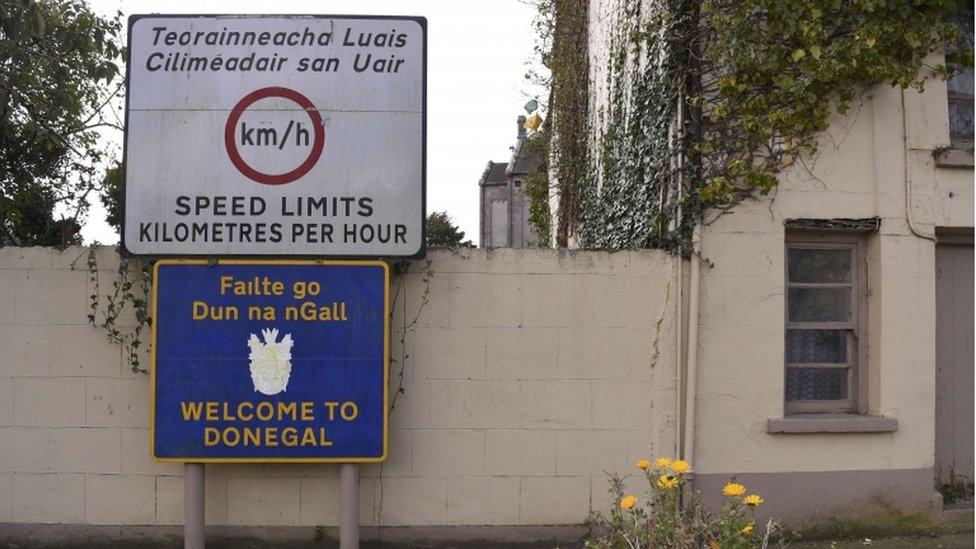
Communities on the 300 mile land border between Northern Ireland and the Irish Republic remain anxious about what Brexit will mean for them.
With the SNP pressing for Single Market status for Scotland whatever happens to England and Wales, the eventual solution in Ireland could have implications for the border between Scotland and England.
David Allison of BBC Radio Scotland's Good Morning Scotland programme made a road trip along the border to find out what people there think nearly six months on from the EU referendum.

When you stand on the quayside at the small town of Warrenpoint on the east coast of Northern Ireland and look across the River Newry and Carlingford Lough the opposite coast is the Irish Republic.
So for places like this, Brexit and what it actually means is a pressing real question affecting everyday life.
And nowhere more so than at Warrenpoint Harbour, a busy commercial port which is the second-largest in Northern Ireland and the fifth biggest on the whole of the island of Ireland.
All the steel imported from Germany for the rebuilding of Dublin Airport came through this port and imports and exports are split almost fifty-fifty between the republic and the north.
Warrenpoint Harbour Authority's Peter Conway believes their location and free access to both countries is key to their success.
He said: "We're half way between Belfast and Dublin on the main Irish economic corridor and if you weren't a success here you'd be doing something wrong.
"Forty-eight per cent of trade is with the Republic and if that market were in some way disadvantaged by tariffs or restrictions or delays or delays on the border it would be a very dangerous business for us."
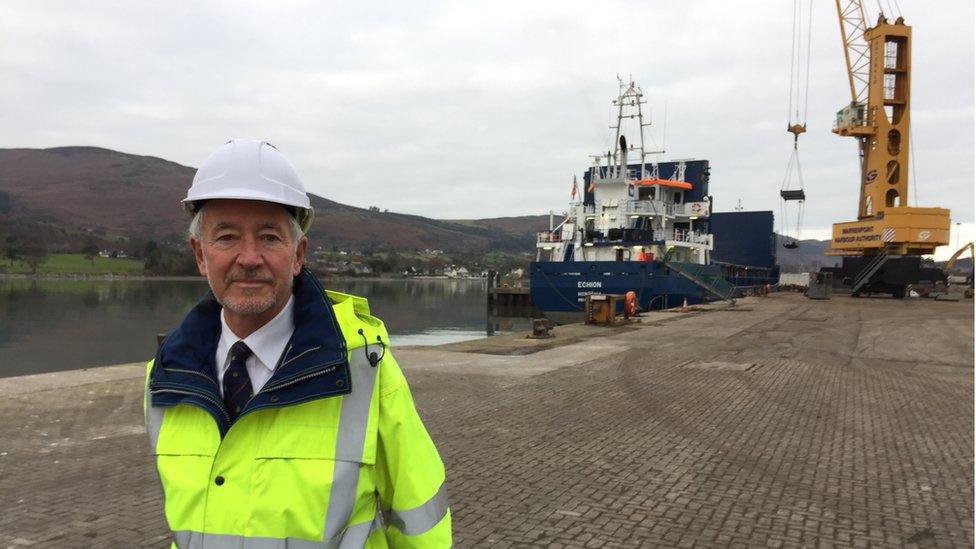
It's not just people on the northern side who are concerned about Brexit.
A half hour drive away lies Dundalk in the Irish Republic, a border town which following the end of the Troubles and the openness of the European Single Market has looked increasingly to the North - to places like Newry and Armagh - for much needed business opportunities.
Paddy Malone of the local chamber of commerce says a hard border would be disastrous.
"Suddenly it's saying to business people you can only deal in one direction," he told me.
"It becomes very difficult and cross border trade was increasing quite significantly.
"The other thing would be commuters. A lot of people live in the North and work in the South where wage rates are considerably higher."
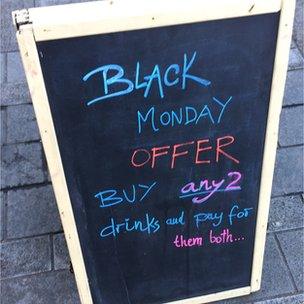
Dundalk has found a way of attracting trade from both sides of the border
A short drive back over the border is Dundalk's Northern Ireland equivalent, Newry.
Conor Patterson from the Newry and Mourne Enterprise Agency says the opportunities from peace and the single market have transformed the area.
He explained: "In the early 70s we had unemployment of almost 30%, the highest in Western Europe. It's now 2.5%.
"The prospect of any re-engineering of what has become an invisible border is deeply worrying.
"The British government attempted to have the hardest of hard borders here and none of that worked. We still had terrorist incidents, active smuggling, and all the problems that attended a hard border."
The collapse in the value of the pound relative to the Euro has boosted retail businesses in Newry in the run up to Christmas.
Post-Brexit price inflation is yet to kick in and shoppers are making the most of it.
Jack McPolin knows all about the importance of border fluidity. He owns a pharmacy chain operating in Newry and Dublin and already had a strong trade in Newry from people from the Republic coming to get cheaper prescriptions than they would pay in the South.
He says the pound-Euro exchange rate has accelerated that trend, but one of his biggest concerns is about the potential impact of a hard border on his employees.
"A lot of our staff will work on one side of the border and live on the other and that works both sides, so this is going to complicate things massively," he said. "At the moment there is effectively no border."
The border and old Customs post on the old Dublin Road between Newry and Dundalk
Concerns about what a hard Brexit would do to border communities recently prompted demonstrations on the border with mock customs and passport check points set up to remind people of how it used to be in days gone by.
Standing right on the border beside a disused customs post on the old Dublin road between Newry and Dundalk, Border Communities Against Brexit spokesman Declan Fearon said that while 44% of people in Northern Ireland voted to leave the EU, all the constituencies along the border voted remain.
He said: "That says a lot about the thinking of people in the border corridor.
"In a way it doesn't affect as much people who live say 100 miles away from here further north, but certainly for communities along the border this really is the eye of the storm.
"We can't even contemplate what it would be like to go back to how it was twenty years ago."

Declan Fearon hopes border posts remain disused
From the east the next stage of the road trip was from the east over to the north west, to Pettigo in County Donegal.
It's a small village which lies in the Irish Republic. But step a few feet across a stone bridge and you are in Tullyhommon in Northern Ireland.
Pettigo and Tullyhommon, two villages making up one place on the border between the Irish Republic and Northern Ireland
The border doesn't really exist in any meaningful sense and the two villages are benefiting from the end of the troubles and the European single act to become much more of a single place, which happens to be in two different countries.
Paul Gallagher, who was born and raised in Tullyhommon in the north, lives in a house right by the bridge.
He remembers it wasn't always so easy to get to Pettigo and his bridge was blocked by the army.
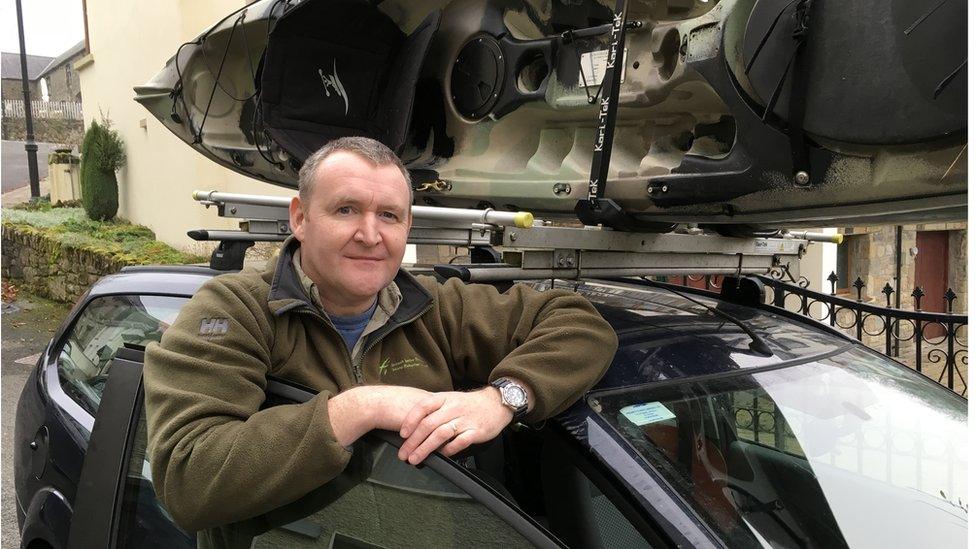
A house right on the bridge is occupied by Paul Gallagher
"This village has suffered by being split in two" he said. "It's a disaster."
And he believes Leave voters have no idea about what a hard border would mean.
"They don't understand because it's not on their doorstep. Here it's a reality."
Again the end of the Troubles and Europe have allowed a reinvention of the area, and the Termon Complex in Pettigo is the new focus of this new community.
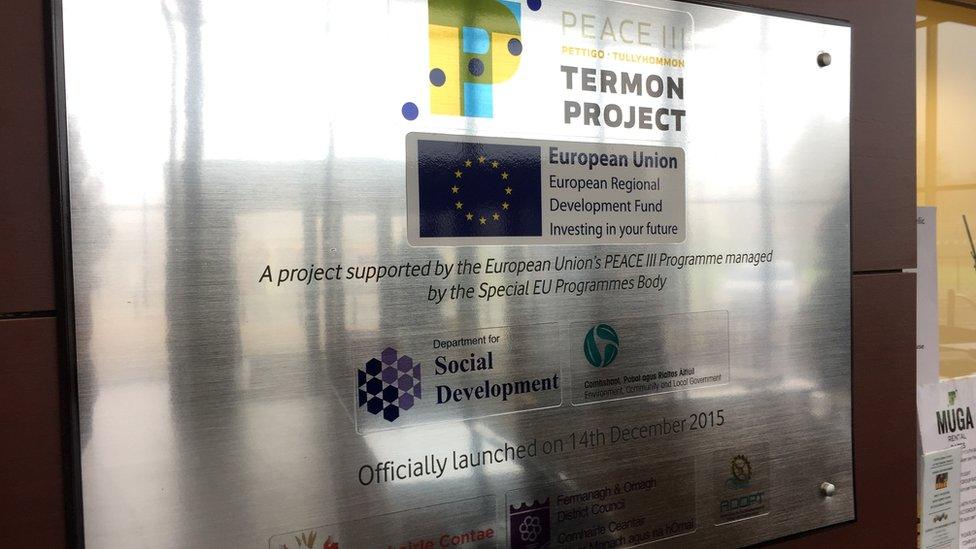
The Termon Complex was funded by local councils on both sides of the border, as well as the EU
Part sports complex, entertainment venue, meeting place and general community hub it's funded by local councils both sides of the border as well as by EU money - all directly as a result of the peace brought about by the Good Friday Agreement.
The centre is managed by a Scot, Martin McAndrew, who's originally from Kelso but has lived here for 17 years.
"The building is a legacy of the peace process, a focal point for communities to re-engage which for a few years wasn't happening," he explained.
There's even a cross-border Association for the Development of Pettigo and Tullyhommon, which works to boost that sense of community and drive business development along the way.
The association's Natasha McGrath fears the result of the EU referendum poses a real threat.
She said: "Although a lot of work has been done, there's still a lot more to be achieved and we feel that post Brexit it's going to have a very detrimental effect on both our communities on both sides of the border."

Natasha McGrath fears the effects of Brexit on border communities
So what was learned during the 300 mile road trip, and what might it mean for Scotland?
Once gained, fluidity of movement is highly valued in the border regions of Northern Ireland and the Republic - and people are very worried that it might be lost, with severe consequences for both business and communities.
The older generation remembers how things were during the Troubles and before the advent of the single market and few who live near the frontier want to go back.
Despite that, 44% of people in Northern Ireland voted for Brexit, presumably because sovereignty and identity was more important to them than the economy and the impact on border communities.
With the Scottish government pressing for single market membership for Scotland whatever happens for the rest of the UK as the "least worst" Brexit option, the solution for the Irish border could be the key to answering the question of what exactly Brexit means.